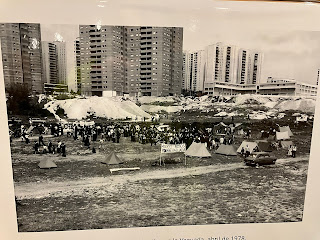(José Guereñu en Exposición "Fotógrafos en el Barrio de El Pilar: años 70")
In order for me to be named Ángel González,
And for my being weighting on the ground,
It was required a broad territory
And a long time:
Men of all seas and lands,
Fertile women’s wombs, bodies
And more bodies, mixing together
Without a pause in a new core.
Solstices and equinoxes gave birth
With their changing light, their different sky,
To my flesh old voyage
Crawling through the eons and the bones.
From its slow and painful travel,
From its departure to the end, surviving
Wrecks, holding
The dead’s last breath,
I am but the result, the fruit,
The remnant, rotten, among the rest;
This one you see here,
Just this:
A tenacious rubble, resisting
Its ruin, fighting against the wind,
Walking the roads that go
Nowhere. The success
Of all failures. The maddened
Strength of expiration...
AG
(Del libro "Áspero mundo". Traducción Guillermo Ruiz)
Se diría que aquí no pasa nada,
pero un silencio súbito ilumina el prodigio:
ha pasado
un ángel
que se llamaba luz, o fuego, o vida.
Y lo perdimos para siempre.
(AG, Alba en Cazorla)
(¿No es la historia una acotación del poema y no a la inversa?
Y también es evidente, por lo expuesto, que la función del poeta no es narrar lo que ha sucedido, sino lo que podría suceder, y lo posible, conforme a lo verosímil y lo necesario. Pues el historiador y el poeta no difieren por contar las cosas en verso o en prosa (pues es posible versificar las obras de Heródoto, y no sería menos historia en verso o sin él.). La diferencia está en que uno narra lo que ha sucedido, y el otro, lo que podría suceder. De ahí que la poesía sea más filosófica y elevada que la historia, pues la poesía narra más bien lo general, mientras que la historia, lo particular"
















No comments:
Post a Comment